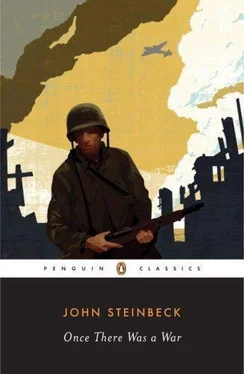John Steinbeck - Once there was a war
Здесь есть возможность читать онлайн «John Steinbeck - Once there was a war» весь текст электронной книги совершенно бесплатно (целиком полную версию без сокращений). В некоторых случаях можно слушать аудио, скачать через торрент в формате fb2 и присутствует краткое содержание. Город: New York, Год выпуска: 1960, Издательство: Bantam Books, Жанр: Классическая проза, на английском языке. Описание произведения, (предисловие) а так же отзывы посетителей доступны на портале библиотеки ЛибКат.
- Название:Once there was a war
- Автор:
- Издательство:Bantam Books
- Жанр:
- Год:1960
- Город:New York
- ISBN:нет данных
- Рейтинг книги:3 / 5. Голосов: 1
-
Избранное:Добавить в избранное
- Отзывы:
-
Ваша оценка:
- 60
- 1
- 2
- 3
- 4
- 5
Once there was a war: краткое содержание, описание и аннотация
Предлагаем к чтению аннотацию, описание, краткое содержание или предисловие (зависит от того, что написал сам автор книги «Once there was a war»). Если вы не нашли необходимую информацию о книге — напишите в комментариях, мы постараемся отыскать её.
Once there was a war — читать онлайн бесплатно полную книгу (весь текст) целиком
Ниже представлен текст книги, разбитый по страницам. Система сохранения места последней прочитанной страницы, позволяет с удобством читать онлайн бесплатно книгу «Once there was a war», без необходимости каждый раз заново искать на чём Вы остановились. Поставьте закладку, и сможете в любой момент перейти на страницу, на которой закончили чтение.
Интервал:
Закладка:
“When we landed troops?” the commodore began, and then he shut himself off. “Oh, yes. I see,” he said. “Yes, when we landed troops.” One of the officers shivered and grinned at the commodore.
“I wish those paratroopers would come in about now,” he said.
“I wouldn’t mind it either,” the commodore replied. And he went on to the old man in the pajamas, “Where will the Germans go?”
“They’ll go to their radar station to destroy it. Then they have some entrenchments on the hill. I think they will try to hold them there.” And at that moment there came a very large explosion and a fire started back on the hill, a fire large enough so that it illuminated the little dock and the entrance to the bay. “That will be the radar station now,” the old man said. “They are very thorough. Too bad the troops you landed didn’t get there first.”
“Yes,” said the commodore, “isn’t it?”
More Italians came down the hill then and deposited their arms. They seemed to be very glad to let them go. Apparently they had never loved their guns very much.
On the dock the five Americans stood uneasily and the safety catches were off their guns, and their eyes moved restlessly among the Italians. The firelight from the burning buildings high on the hill made deep shadows in back of the dock houses.
The commodore said softly, “I wish those paratroopers would get here. If Jerry finds out there are only five of us, I wouldn’t give any odds on us.”
And then there was a sound of a boat’s motor and the commodore smiled with relief. The forty-three paratroopers were coming in to the shore. “Give them a light, coxswain,” the commodore called. “Show them where to come.”
December 8, 1943 —
The five men from the destroyer moved restlessly about the quay on the island of Ventotene which they had accidentally, and with five kinds of luck, captured. The paratroopers did not arrive. There was no sign from the destroyer standing off shore and minutes got to be hours. The dark town on the cliff became peopled with imaginary snipers and back on the hill where the Germans had retreated an occasional explosion roared as they blasted more installations. They didn’t know how many Americans there were, and there were five, and the Americans did not know how many Germans there were, and there were eighty-seven. This was very largely in favor of the Americans, because if the Germans had known — It is not a nice thing to dwell on.
Your impulse when you are alone and not knowing when you are going to be fired on out of the dark is to keep moving, to pace restlessly about and to be very timid about getting a light of any kind behind you. This pacing about is probably the worst thing you can do. According to Bob Capa, who has been in more wars and closer to them than nearly anyone now living (and why he is living no one knows), the thing to do is not to move at all. If you sit perfectly still in the dark, he argues, no one knows you are there. It is only by moving about that you give away your position. He also holds that under fire the best thing is to sit still until you know where the fire is coming from. This is a hard thing to do but it must be correct, because Bob Capa is still alive. But every instinct is toward shuffling about and leaving the place where you are. But getting a light behind you is the worst. It seems to burn you in the back and in your mind’s eye you can see what a beautiful target you are to someone out in the dark, you and that great black shadow in front of you.
There probably is nothing in the world so elastic as subjective time. There is no way of knowing how long it took for those forty-three paratroopers to get ashore. It may have been half an hour and it may have been three hours. It felt to the five men ashore like three days. Probably it was about forty-five minutes. The dark, hostile island and the dark water gave no comfort. But after an interminable time there was a secret little mutter of engines. Then out in the dark there was a little flutter of light. The boat was asking for directions. One of the officers on the quay got down on his stomach and leaned over the stone parapet and signaled back with his flashlight so that it could not be seen from the island. And at intervals he flashed his torch to guide the boat.
It came out of the dark abruptly: out of the pitch dark it slipped noiselessly and bumped gently against the quay. And it was one of those boats even the name of which the Navy will cut out if I put it in, but the important thing was that there were forty-three paratroopers on board. They seemed to flow over the side; they were very quiet. Their captain went to work instantly. He sent out pickets before he had been one minute ashore, and they slipped away up the hill to guard the approaches to the harbor. Some crept up into the town, armed with their rifles and grenades, and they occupied the tops of buildings, and others went down to the beaches to watch the seaward approaches. Meanwhile a little gangplank was ashore, and the supplies were coming down onto the quay in the darkness.
In the middle of this work there was a growl of a plane overhead. The captain of paratroopers gave a curt order and the men took cover. The plane droned over, and as it got offshore again the destroyer burst into action. She flamed like a flowerpot at an old-fashioned Fourth of July fireworks exhibit. Her tracers spread like a fountain. And then she was dark again and the plane was gone.
The unloading continued until there was a pile of goods on the quay, rations in cases and boxes of ammunition and machine guns and the light sleeping rolls of the paratroopers. They did not bring any luxuries with them. They never do. Food and ammunition are their main interests. They get along with very little else. But on Ventotene they brought water too, in those handled containers which are used for both water and gasoline. For Ventotene has no water. In other times water barges came out from the mainland. The only local water is that caught in cisterns during the rainy months.
When the supplies were landed the three paratrooper officers and the naval officers gathered in a little stone building on the waterfront. And an electric lantern was on the floor and the doors and windows were shut so that no line of light could show out. The faces were lighted from below and they were strained faces, with the jaw muscles pulled tight. The maps were out again.
“I’m not going to throw my men against a bigger force in the dark,” the captain of paratroopers said. “Jerry will be trenched by now. I’m not going to move until morning. We’ve only got half as many men and no artillery.”
An officer said, “Maybe — maybe we could talk them out of it. Let’s have some of the Italians in and see what we can do. The Jerry doesn’t know how many men we have or how many ships. Let’s think about that a little. It’s just barely possible we could talk them out of it.”
“How?” the captain asked.
“Well, would you let me go up with a white flag in the morning?”
“They’d bump you.”
“Would you let me try?”
“Well—”
“Might save a lot of trouble — sir—”
“We can’t afford to lose officers.”
“You won’t lose me. Just give me a nod.” The captain looked at him for a long time and then he smiled thinly and his head dipped, almost imperceptibly.
December 10, 1943 —
The lieutenant walked slowly up the hill toward the German positions. He carried his white flag over his head, and his white flag was a bath towel. As he walked he thought what a fool he was. He had really stuck his neck out. Last night when he had argued for the privilege of going up and trying to kid the Jerry into surrender he hadn’t known it would be like this. He hadn’t known how lonely and exposed he would be.
Читать дальшеИнтервал:
Закладка:
Похожие книги на «Once there was a war»
Представляем Вашему вниманию похожие книги на «Once there was a war» списком для выбора. Мы отобрали схожую по названию и смыслу литературу в надежде предоставить читателям больше вариантов отыскать новые, интересные, ещё непрочитанные произведения.
Обсуждение, отзывы о книге «Once there was a war» и просто собственные мнения читателей. Оставьте ваши комментарии, напишите, что Вы думаете о произведении, его смысле или главных героях. Укажите что конкретно понравилось, а что нет, и почему Вы так считаете.









